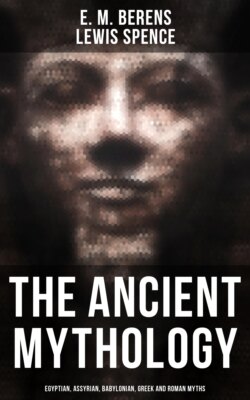Читать книгу The Ancient Mythology: Egyptian, Assyrian, Babylonian, Greek and Roman Myths - Lewis Spence - Страница 35
На сайте Литреса книга снята с продажи.
Hymn to Adar
ОглавлениеA fine hymn to Adar describes the rumbling of the storm in the abyss, the 'voice' of the god:
The terror of the splendour of Anu in the midst of heaven.
The gods, it is said, urge Adar on, he descends like the deluge, the champion of the gods swoops down upon the hostile land. Nusku, the messenger of Mul-lil, receives Adar in the temple and addresses words of praise to him:
Thy chariot is as a voice of thunder.
To the lifting of thy hands is the shadow turned.
The spirits of the earth, the great gods, return to the winds.
Many of the hymns assist us to a better understanding of the precise nature of the gods, defining as they do their duties and offices and even occasionally describing their appearance. Thus in a hymn to Nebo we note that he is alluded to as "the supreme messenger who binds all things together," "the scribe of all that has a name," "the lifter up of the stylus supreme," "director of the world," "possessor of the reed of augury," "traverser of strange lands," "opener of wells," "fructifier of the corn," and "the god without whom the irrigated land and the canal are unwatered." It is from such texts that the mythologist is enabled to piece together the true significance of many of the deities of ancient peoples.
A hymn to Nusku in his character of fire-god is also descriptive and picturesque. He is alluded to as "wise prince, the flame of heaven," "he who hurls down terror, whose clothing is splendour," "the forceful fire-god," "the exalter of the mountain peaks," and "the uplifter of the torch, the enlightener of darkness."
Such descriptive hymns are the most valuable assets possible in the hands of the judicious student of myth or comparative religion.
1. Vol. iii, p. 167. Second Edition. (By kind permission of Messrs Macmillan and Co.)
2. Ut-Napishtim.
3. This passage has, however, been interpreted by some Biblical scholars to mean that "Nimrod went out of this land into Asshur" (or Assyria) "and built Nineveh." See Bryant, Antient Mythology, vol. vi, pp. 191-2-3.
